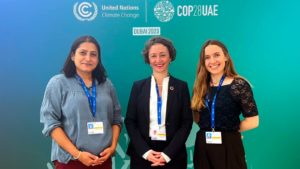
The 2023 UN Climate Change Conference (COP28) on advancing multilateral responses to the climate crisis took place in Dubai, United Arab Emirates, from November 30 to December 12. Again IDOS was represented at this year’s UN Climate Change Conference (COP28) in Dubai with a scientific delegation and several events. Read more about the activities and new impetus at COP28 here.
Very high on this year’s COP agenda were expectations to deliver ambitious outcomes regarding the first Global Stocktake under the Paris Agreement, a framework for the operationalisation of the newly created loss and damage fund, and a framework for the Global Goal on Adaptation (GGA). COP 28 got off to a good start with the adoption of the loss and damage fund and first financial pledges for its required operationalisation as an important step towards global climate justice. Other issues, such as an agreement on a potential phase-out of fossil fuels and an ambitious GGA proved to be far more challenging in the negotiations. The final outcome, and in particular the first time mentioning “transitioning away from fossil-fuels” in a COP outcome document since the 1992 Rio Conventions, is considered historic by many parties and observers as signalling the beginning of the end of the fossil-fuel era. In addition, a key point pushed by the European Union, the tripling of global renewable energy capacity and doubling of energy efficiency by 2030, also found its way into the outcome document. Many developing countries, however, were dissatisfied with the weak language on means of implementation and in particular the targets, timelines and lack of new and additional finance under the GGA.
As an observer organisation, IDOS showcased research findings at events and analysed progress made on various agenda items of the negotiations. Our key areas of focus were climate finance, loss and damage funding arrangements, just transitions, and the global goal on adaptation. IDOS experts further engaged in other climate policy fields such as health, human mobility, local communities and indigenous peoples, and non-state climate action.
Designing coherent and equitable climate policies for a just transition
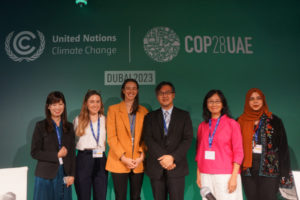
On 6 December IDOS co-hosted an official side-event with the Stockholm Environment Institute (SEI) and the Taiwan Youth Climate Coalition on steps to best design coherent and equitable climate policies for a just transition. The second panel on ‘Ensuring the ‘just’ in just (energy) transitions: insights from Germany, South Africa and other JET-P countries” was moderated by IDOS researcher Alexia Faus Onbargi, and brought together panellists from BMZ (Ms Brigit Strube), IRENA (Ms Mirjam Reiner) and WWF-SA (Ms Innocentia Modau).
Key points from the panel include: Just Transition is a bridge between the 2030 Agenda for Sustainable Development and the Paris Agreement, the ‘just’ in Just Transition must happen in specific local contexts and that Just Transition processes must include civil society organisations from the very beginning.
Live doodleists from Tofu Creatives captured the discussion through visual storytelling.
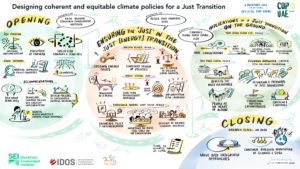
Climate resilient health systems: delivering on the promise to leave no child behind
On the occasion of the first Health Day at the 28th UN Climate Change Conference (COP28), the German pavilion hosted a side event on 3 December that focused on Climate Resilient Health Systems. In the panel discussion, organised by Save the Children International and moderated by Dr Revati Phalkey, following panellists reflected on the role of global health partners to ensure equitable access to health systems: Prof. Anna-Katharina Hornidge (IDOS), Dirk Meyer (BMZ), Inger Ashing (Save the Children International), Prof. Kristie L. Ebi (University of Washington), Dr Youssef Nassen (UNFCCC), Dr Phonepaseuth Ounaphom (Ministry of Health, Lao PDR) and Marie-Ange Saraka-Yao (Gavi – The Vaccine Alliance).
Pointing out the flagship report “Healthy living on a healthy planet” by the German Advisory Council on Global Change, Anna-Katharina Hornidge underlined the importance of promoting health literacy by integrating planetary health-oriented teaching into school curricula. At the same time, she emphasised the role of the G7 and the G20 as important governance fora, which should increasingly engage with questions, related to health, particularly children-oriented health and universal health coverage.
Pathways for strengthening global climate finance mechanisms for drought and land degradation
On the Food, Agriculture and Water Day on 10 December, IDOS co-hosted the event “Pathways for strengthening global climate finance mechanisms for drought and land degradation” at the Land & Drought Resilience Pavilion in partnership with the United Nations Convention to Combat Desertification (UNCCD) Secretariat and the Africa Research and Impact Network (ARIN).
Speakers included Dr Daniel Tsegai (UNCCD), Mr Tshewang Dorji (Global Environment Facility, GEF), Ms Mercy Grace Munduru (ActionAid International Uganda) and Dr Mariya Aleksandrova (IDOS). They discussed synergies between the UNCCD and UNFCCC regimes with a particular focus on financing climate change adaptation and responses to residual loss and damage, as well as on opportunities for enhancing national and local governance structures for effective allocation and utilisation of climate finance for drought and land degradation in Africa. The panellists further highlighted the need of recognising drought as a global challenge, the importance of investing in drought risk reduction and preparedness, and the crucial role of civil society organisations to that end.
Immobility as an overlooked aspect in the loss and damage debate
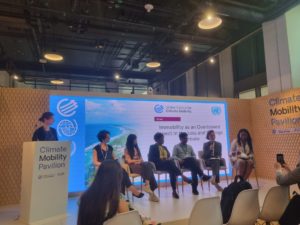
On 10 December, IDOS co-organised a side event at the climate mobility pavilion with the German Institute of Security and International Affairs (SWP). Andrea Jiron (Laruta del Clima), Josette Edward-Charlemagne (Organisation of Eastern Caribbean States (OECS) Commission), Leona Hollash (Federal Ministry of Economic Cooperation and Development (BMZ)), Nadine Biehler (SWP), Shakirul Islam (OKUP, a grassroots migrant organisation) and Susan S. Ekoh (IDOS) discussed the topic of immobility as an overlooked aspect in the loss and damage debate.
The session was moderated by Anne Koch (SWP) with discussions highlighting the issue of climate immobility from research, civil society, community and policy perspectives. Overall, there was consensus that climate-induced human mobility is complex, and immobility being part of that complexity needs to be accounted for policies and climate finance (e.g. through funding for adaptation and loss and damage). The discussions amplified that people have the right to move but also to stay and that this should be reflected in the types of support that are provided to affected communities. This would include considerations for economic and non-economic losses from the impacts of climate change. Furthermore, there is the need to fill research and data gaps to inform adequate policies and responses.
Green hydrogen for sustainable industrial development: a new report
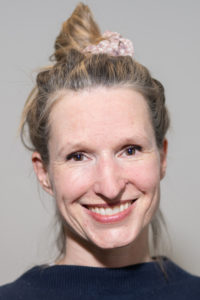
On 10 December 2023, UNIDO, IRENA and IDOS co-hosted a side event in the IRENA Pavilion to present their joint report „Green hydrogen for Sustainable Industrial Development: A Policy Toolkit for Developing Countries”. Read more…

Schreibe einen Kommentar